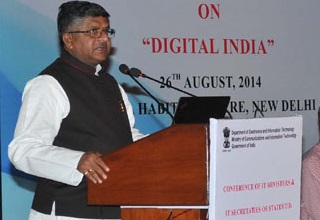States to work together to implement 'Digital India' programme
Updated: Aug 27, 2014 04:57:32pm

Union Minister of Communications and Information Technology and Law and Justice, Shri Ravi Shankar Prasad chaired the conference that was attended by IT Ministers from 10 states, namely Andhra Pradesh, Bihar, Goa, Gujarat, Jammu and Kashmir, Madhya Pradesh, Meghalaya, Orissa, Telangana and Uttar Pradesh yesterday.
IT Secretaries and senior officials from the IT Department from 33 States/UTs also participated in the conference.
‘Digital India’ is a new initiative of Government of India, to transform India into a digitally empowered society and knowledge economy, an official release said.
It is an umbrella programme that covers multiple government ministries and departments. It weaves together a large number of ideas and thoughts into a single, comprehensive vision so that each of them is seen as part of a larger goal. The vision of ‘Digital India’ is centred on three key areas namely, digital infrastructure as a utility to every citizen, governance and services on demand and digital empowerment of citizens.
The programme will be coordinated by DeitY and implemented by the entire Government.
Digital Infrastructure as a utility to every citizen includes availability of high speed internet as a core utility for delivery of services to citizens, cradle to grave digital identity that is unique, lifelong, online and authenticable to every citizen, mobile phone and bank account enabling citizen participation in digital and financial space, easy access to a common service centre, shareable private space on a public cloud and safe and secure cyber-space.
Governance and services on demand includes seamlessly integrated services across departments or jurisdictions, availability of services in real time from online and mobile platforms, all citizen entitlements to be available on the cloud, digitally transformed services for improving ease of doing business, making financial transactions electronic and cashless and leveraging GIS for decision support systems and development.
Digital empowerment of citizens includes universal digital literacy, accessible digital resources universally, availability of digital resources / services in Indian languages, collaborative digital platforms for participative governance and portability of all entitlements through cloud. Citizens would not be required to produce Government documents or certificates, etc. in physical form.
Digital India comprises nine pillars, namely, broadband highways, universal access to mobile connectivity, public internet access programme, e-governance: reforming government through technology, e-kranti - electronic delivery of services, information for all, electronics manufacturing, it for jobs and early harvest programmes. Each of these components is a complex programme in itself and cuts across multiple government ministries and departments.
The Digital India programme pulls together many existing schemes, which will be restructured and re-focused in terms of enhancing the scope, leveraging emerging technologies like cloud, mobile etc, focusing on transformational process reengineering and process improvements, undertaking interoperable and integrated service delivery based on standards and will be implemented in a synchronized manner.
It will also enhance the portfolio of “Made in India” electronic devices, products and services and will create job opportunities for our youths within the country. (KNN Bureau)












